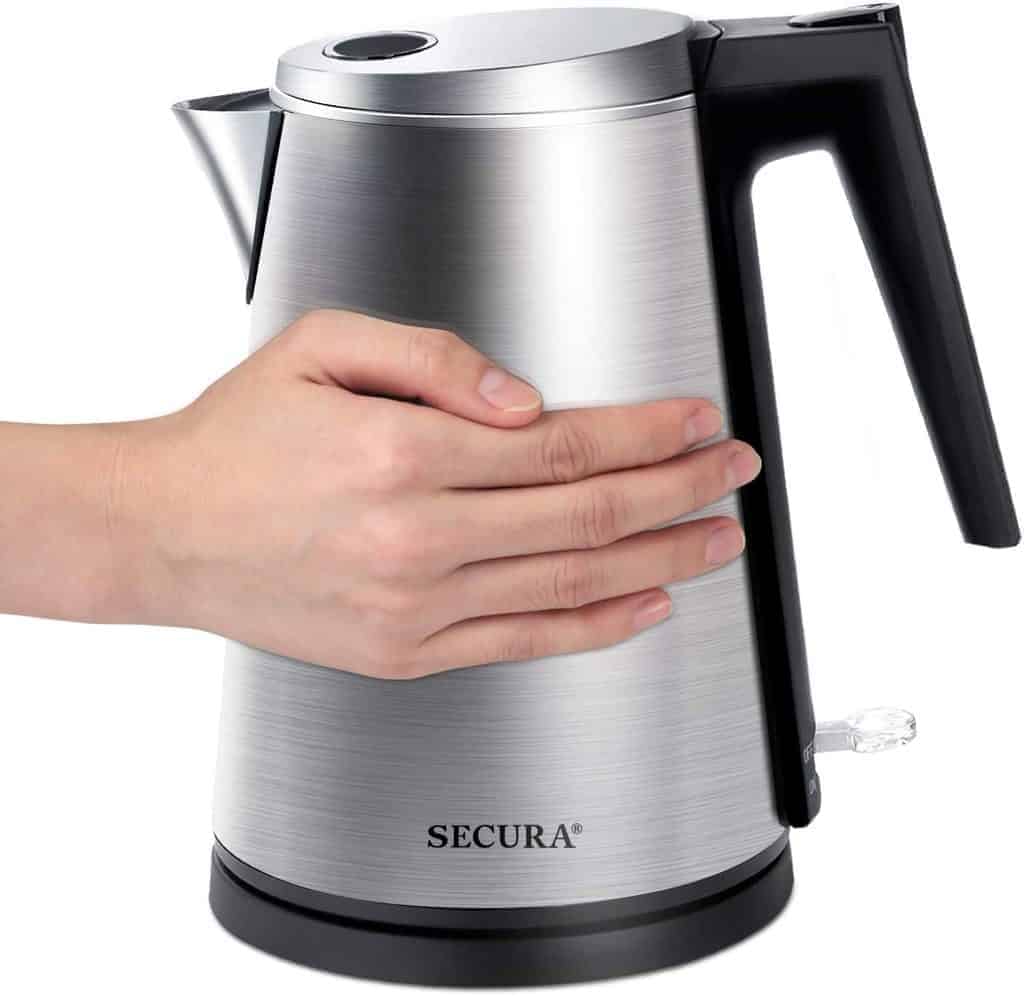Disclosure: Some of the links below are affiliated; we may earn a small commission if you click through and make a purchase. We only ever add brands & products we truly believe in. Thank you for supporting the brands who are making the world a better place!
More and more consumers are starting to learn about the dangers of cooking with Teflon pans and are swapping their toxic non-stick cookware for safer options. But did you know that tea kettles can also be problematic?
Many tea kettles on the market are made with materials that contain harmful substances, which can leach into the water when we boil it.
Thankfully, if you are in the market for a new tea kettle, you do not have to buy one of those toxic ones. There are many models you can choose from that are safe to use whenever you feel like brewing a cup of tea (or coffee).
We have selected 11 non-toxic tea kettle brands in this article, so you can safely cozy up and warm up with a nice cuppa now that the colder months are officially here!
Choose high quality stainless steel containing a chromium-to-nickel ratio of 18/8 or 18/10, which means they’re certified as food safe. You’ll find this information on any packaging labels or you can check on the manufacturer’s website. The type of tea kettle that won’t rust may also be labeled as 304 or 316.

WHAT NON-TOXIC MATERIALS SHOULD YOU SEARCH FOR?
The best, non-toxic materials for tea kettles are stainless steel and borosilicate glass. Both are resistant to high temperatures, so they are great, durable options for both electric and stovetop kettles.
If you opt for a stainless steel model, avoid 201-grade stainless steel because it might rust over time. Instead, favor those made with 18/8, 18/10, 304, or 316 food-grade stainless steel.
If you buy a tea kettle made with either borosilicate glass or high-quality stainless steel, you can confidently drink your hot beverages without worrying. They will be free of heavy metals and other toxic substances like PTFEs, PFOAs, and PFAs!
WHAT MAKES A TEA KETTLE NON-TOXIC & SAFE TO USE?
A non-toxic tea kettle is one made with safe materials that do not leach harmful chemicals when heated. So the number one thing you should look out for when buying a new kettle is what it is made out of.
Avoid models made from plastic, particularly those that have plastic parts directly exposed to boiling water. When heated, the plastic will release endocrine-disrupting chemicals into your beverages, no matter if it is BPA-free or not.
You also want to steer clear of tea kettles made from aluminum, cast iron, copper, or ceramic, including colored glaze kettles with enamel coatings. Those can leach heavy metals at high temperatures, such as lead and cadmium.
Finally, make sure the kettle’s heating elements are hidden. Those with exposed heating coils usually contain high percentages of nickel, which is problematic if you are allergic.
Why You Need To Replace Your Toxic Plastic Kettle
FAQ
What is the healthiest kettle to buy?
Do stainless steel kettles leach?
What is better plastic or metal kettle?
Is stainless steel kettle better than glass?
Is stainless steel a safe tea kettle?
Stainless steel (18/8 or 304) is a popular choice for non-toxic and safe tea kettles because it’s durable, rust-resistant, and does not leach harmful substances into the water. Borosilicate glass is known for its resistance to thermal shock and is a safe option for tea kettles.
Is a stainless steel kettle safe?
Although not all of them are made with 100% non-toxic materials, we recommend those made with a stainless steel body. For instance, we love the V60 “Fit” Drip kettle, which is safe for all heat sources, from induction and gas to halogen and coil cooktops. For a larger capacity, make sure to pick the Smart G kettle!
What is the safest material for a tea kettle?
The safest materials for tea kettles are borosilicate glass and stainless steel. Stainless steel is known for being inert and stable, making it a safe choice for tea kettles. It does not react with the water or release toxins, even at high temperatures. Borosilicate glass is resistant to thermal shock and does not contain harmful substances.
Why should you buy a stainless steel kettle?
Crafted from high-quality stainless steel, the kettle ensures that no harmful substances are introduced into the boiling water, providing a safe and healthy brewing experience.
